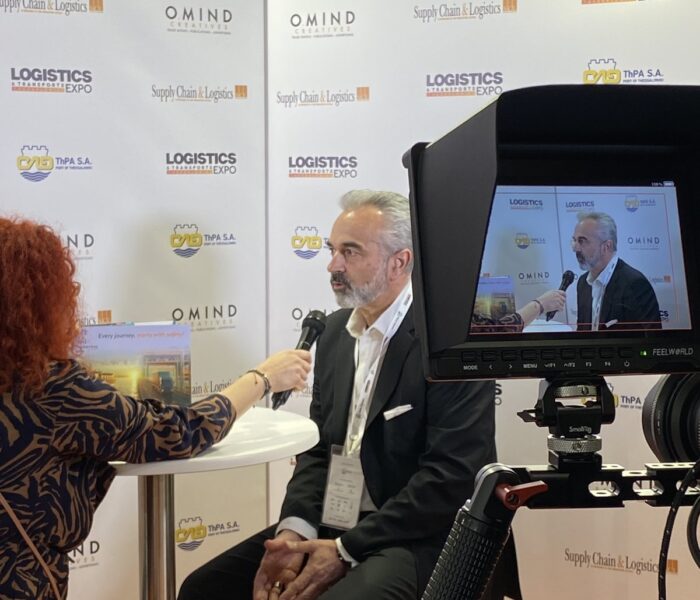
Interview with the CEO of BKS LOGISTICS ahead of the Logistics & Transports Thessaloniki Expo 2025
In an interview given by Mr. Vasilis Zachartzis, CEO of BKS LOGISTICS, to Ms. Mary Efthymiatou ahead of the Logistics & Transports Thessaloniki Expo 2025 and published in SC&L magazine, he focused on the company’s expertise in the transportation of dangerous goods, while also explaining how ‘risk’ is managed in transport operations in Greece.
Below is the interview:
Journalist:
We are here at the second Logistics & Transports Thessaloniki Expo, and we’re joined by Mr. Vasilis Zachartzis, CEO of BKS LOGISTICS. We would like to ask him—not just about the wide range of services the company offers—but to focus specifically on the sector of hazardous cargo. ADR, IMDG transports… Could you tell us what you currently consider to be a “hazardous transport” in Greece, how prepared Greek transport companies are to handle such operations, and what makes BKS LOGISTICS stand out in this particular field?
Vasilis Zachartzis:
Right now, there’s a paradox: while the chemical industry is aligning itself with legislation and regulations regarding the transportation of “risk,” the transport sector has lagged somewhat behind in harmonizing with the full legislative framework.
So, what are we doing? As a company, we have evaluated our services based on the questionnaire of the European Chemical Industry Council (CEFIC). This involves procedures, risk assessments, and of course, the safe transportation of hazardous materials generated by the chemical industry.
The sector, as I mentioned earlier, is still a bit “behind.” There are companies making efforts to adapt, and there are a few that are fully prepared—but they are few. Most still have a long way to go, starting with how they receive hazardous goods, whether they truly understand the risk involved, and how they ensure safe transportation.
In our case, as I said before, with the evaluation we’ve conducted and the continuous training of our staff—along with the support of our Dangerous Goods Safety Advisor (DGSA)—we are doing exactly that. We ensure the transportation of hazardous materials, fully understanding what “risk” means and how our staff should be trained to handle it.
Journalist:
But what exactly does it mean to train your staff? Do they attend specific seminars? Is the training only for drivers, or does it also include administrative personnel? Do you train them based on international standards? How exactly does this process work?
Vasilis Zachartzis:
We conduct training seminars in collaboration with our company’s Dangerous Goods Safety Advisor. We provide ongoing training in risk identification, in the conditions that must be met for the safe receipt and transportation of hazardous goods, as well as continuous risk assessments even before we accept the cargo—through the process we’ve adopted for hazardous goods order management.
Of course, it’s not just the staff that undergoes training—management is trained as well, and in fact, they are trained first. This ensures that the entire workflow related to hazardous goods is managed smoothly and safely.
So, it’s continuous seminars, ongoing assessments, full implementation of health & safety regulations, and constant communication with our clients—the shippers—so that risk information is accurately and effectively transmitted.
Journalist:
I’d like to ask something regarding the clients you mentioned—specifically the commercial companies that work with you. Are they the ones who guide you on what they need for the safe transportation of goods, or is it the other way around? Given that you are certified, are you the ones who inform them about the correct procedures that need to be followed?
Vasilis Zachartzis:
Your observation is correct! Regarding the chemical industry, when it comes to the shipping of hazardous quantities, there is an exchange of information that both sides must manage properly.
As for smaller commercial businesses, what you mentioned is exactly what happens: as a company, we provide the necessary guidelines and information so that the sender, that is, the commercial business, can adapt to the risks involved. This, of course, is related to recent changes in Greek legislation, which now mandates the presence of a Dangerous Goods Safety Advisor (DGSA)—but there is still a gap in this regard. Specifically, to what extent the Association of Dangerous Goods Safety Advisors has the power to convince commercial companies, even in the chemical industry, that the correct procedures must be followed in a very specific manner. Not just because “we do it this way.” This is very important!
Therefore, when dealing with smaller commercial companies, our role is mostly advisory. We also provide this service.
Journalist:
This is very important, because a transport company has essentially surpassed the limits of its regular operations. However, I’d like to ask something else. I see several certifications in your brochure. My question is, does the client pay attention to these? Do they really value them? And what do all these symbols that BKS LOGISTICS has represent?
Vasilis Zachartzis:
There are commercial businesses that pay attention to this, and they value it. This happens because behind every certification, there is real work that has been done. It means that there has been an evaluation, that processes are in place. So, the entrepreneur is called upon to investigate and, if you will, to look behind this certification to see whether the company providing the service meets the necessary processes, whether it is up-to-date, and whether they can rely on it to meet their service and business needs. However, behind all this, there is a lot of hard work, done daily, with great effort and care.
Journalist:
Thank you very much for the information!

